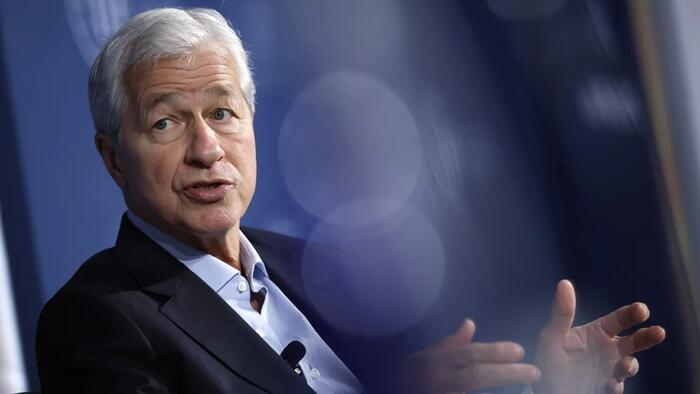Authored by Michael Every via Rabobank,
Get over it, but you can’t get past it
Jamie Dimon of JP Morgan Chase –in Davos(!)– yesterday stated US tariffs are an economic tool or an economic weapon and, “I would put in perspective: If it’s a little inflationary, but it’s good for national security, so be it. I mean, get over it.”
Exactly so. Our ‘grand macro strategy’ report on economic statecraft published after President Trump won re-election stressed that for political realists, not economic idealists, tariffs are always about national security, raising national savings and key related investments, and foreign policy goals; and both Trump’s and US history said we would be seeing a lot more of them.
As Bloomberg puts it, the current state of play is that Trump could potentially introduce sweeping changes to US and global trade policy, giving him a “loaded weapon” –of tariffs T+1– as leverage for national security goals and new capital investment into the US. Or foreign policy goals.
Indeed, following the threat of a 1 February imposition of 25% tariffs on Mexico and Canada, and an additional 10% on China, all for national security reasons, President Trump has stated if Russian President Putin doesn’t accept a peace deal to end the Ukraine War, the US will impose tough sanctions, taxes, and tariffs on Russia’s energy sector which, by implication, might even extend to those buying from Russia or working with it: that could cover the EU (which, ridiculously from a statecraft perspective, still relies on Russian LNG); India; and China.
Our back of an envelope projection is that cutting off Russian LNG from Europe could raise TTF gas prices to €70-80/MWh.
Few in Europe would be saying, “Get over it,” and Europe’s key problem is that it can’t get over its structural geostrategic weakness. Cutting off Russian oil would see prices temporarily spike to $90-95 a barrel before OPEC picked up production to normalise things.
Yet as the economic statecraft report also stressed, in realpolitik things aren’t static.
If President Trump escalates to economic warfare to force President Putin to end physical warfare, Russia (and China, if its third-party neutral trading rights –also detailed in the report– are penalised) can respond with their own economic statecraft, or the other two legs of grand strategy alongside it: political and military statecraft, to up the ante. That’s as the Financial Times says China is shipping sodium perchlorate to Iran to fuel ballistic missiles, which will see some in the US go ballistic; and a report claims two undersea cables connecting Taiwan to its outlying island of Matsu were mysteriously cut yesterday – something that seems to be happening a lot recently, and only on one side of the geopolitical fault-line.
For markets, given Trump and Putin both famously like to escalate to deescalate, and others can easily be dragged into this vortex, volatility remains the watchword.
That’s hard going to get past even if you get over the shock of tariffs being accepted by Jamie Dimon.
Indeed, as politics moves at dizzying speed within the US, prompting the Wall Street Journal to note that ‘CEOs Launch War Rooms, Hotlines to Cope With Trump’s Order Blitz’, in geopolitics, the same is true – just with real War Rooms.
-
Bloomberg reports that, ‘One by One, World Leaders in Davos Fall in Line in Trump Era’, though I can think of a few who don’t and won’t.
-
President Zelenskyy says even if a Ukraine peace deal is signed, it would require 200,00 EU troops in the country to prove sustainable. That’s almost the entire French armed forces. If true, somebody in Europe is going to be spending a vast amount on defence in the next few years. After all, ‘Freedom isn’t free’ – or just free trade.
-
Saudi Arabia’s MBS reportedly offered the US at least $600bn in new trade and investments over the next four years. Some may say Saudi doesn’t have that kind of cash with oil prices at current levels, let alone the lower ones Trump wants to see… then again, neither does the Big Tech group behind the $500bn AI ‘Project Stargate’ announced yesterday, says Elon Musk.
-
The US relisted Yemen’s Houthis as a terrorist organisation, ironically as the latter allows all but Israeli ships to transit Suez again while the current Middle East ceasefire holds – which many there expect is unlikely to last that long.
-
Argentina’s President Milei is prepared to quit the Mercosur trade bloc to get a US FTA. Europe only just introduced an FTA with Mercosur is already losing out.
-
The UK press argues PM Starmer must “fight hard and fast to define Britain’s destiny” and needs “a coherent strategic purpose.” So, grand strategy –where the key choice is does the UK go with the US or the EU?– not a piecemeal technocratic Grand Starmer-gy.
-
France’s trade minister suggested the EU should try to diversify trade to Latin America (more than the FTA with Mercosur minus Argentina?) and ASEAN (which mainly consists of net exporters whom the US can provide security guarantees to which the EU cannot).
-
The Pentagon is sending troops to the US-Mexico border to boost security and airlift out migrants, as Mexico reportedly sets up a tent city to prepare for mass deportations from the US.
-
Secretary of State Rubio’s first official visit will be to the Panama Canal, a break from the precedent of going to key allies first. He also attacked China for its actions vis-à-vis the Philippines and promised the latter an “iron clad” US defence as well as expanded security and economic ties.
Day ahead
Today has the ECB’s Escriva, Canadian retail sales, and US weekly jobless claims, then Eurozone consumer confidence.
Loading…
Read the full article here

